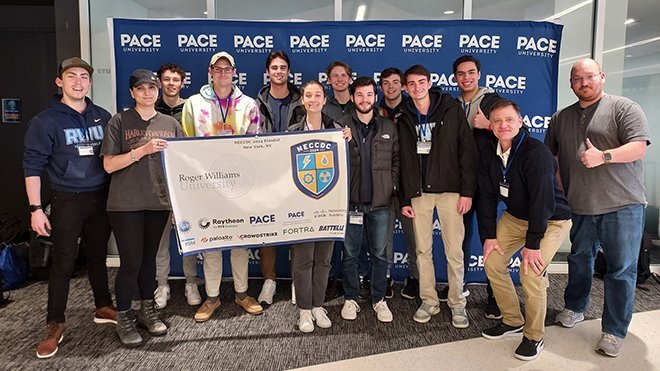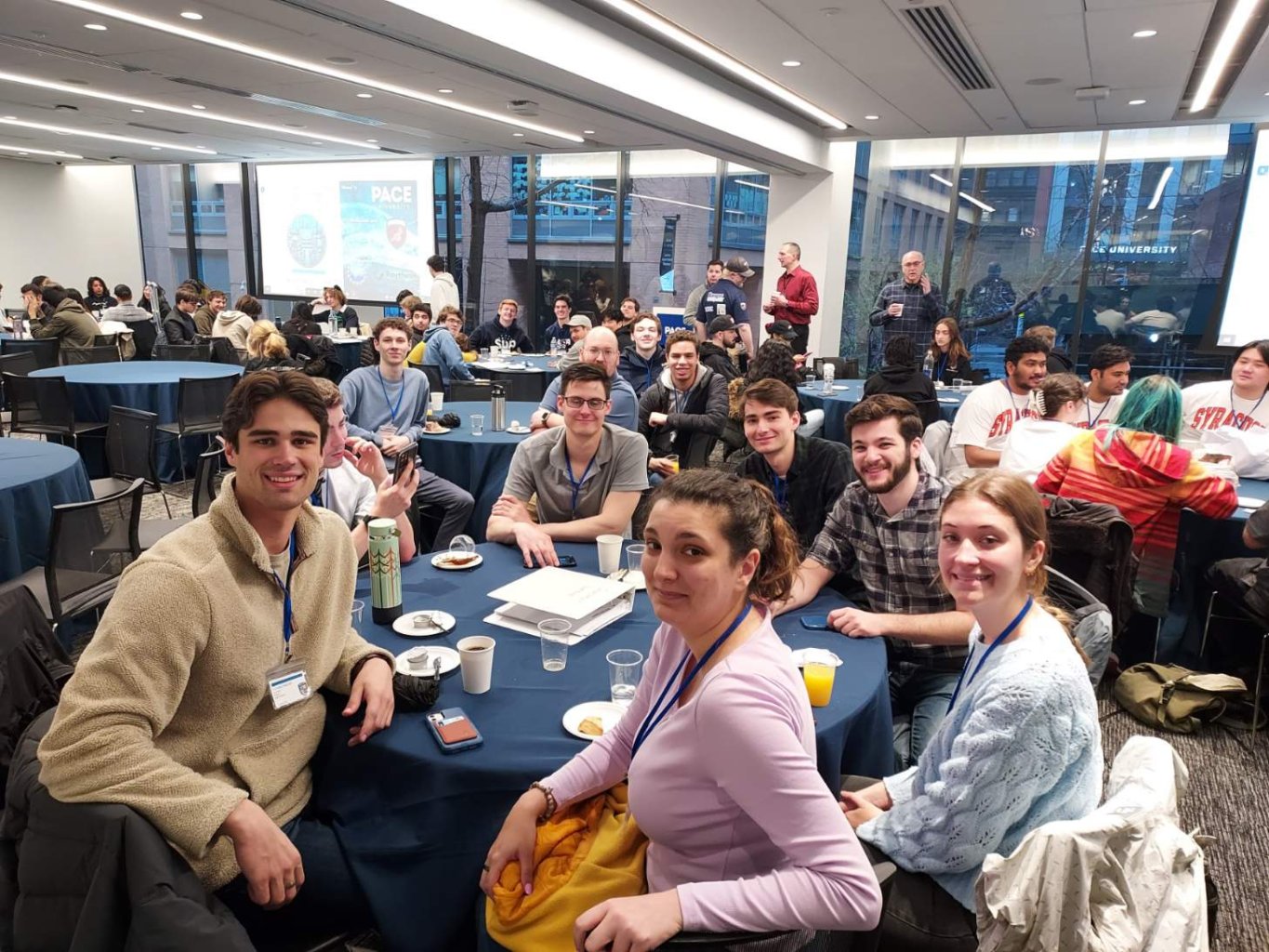Digital Defenders: RWU Cybersecurity Students Excel in First NECCDC Appearance
Members of RWU’s Cybersecurity and Intel Club competed at the Northeast Collegiate Cyber Defense Competition in March, propelled by their collaboration and expert faculty mentorship.

NEW YORK – In an era where more and more hackers are infiltrating digital networks crucial to daily life, having enough people tasked with safeguarding these systems is critical. Among those preparing for such work are the members of Roger Williams University’s Cybersecurity and Intel Club, whose inaugural appearance at the Northeast Collegiate Cyber Defense Competition (NECCDC) has provided hands-on learning to equip them to become guardians of the digital realm.
The annual regional event, part of the National Collegiate Cyber Defense Competition (NCCDC) – the nation's largest premiere competition of its kind – is an experiential-learning exercise for undergraduate students to hone their skills, test their knowledge, and forge invaluable connections within the industry.

Hosted at Pace University in New York City from March 23 to 25, this year’s theme, "Critical Controls: Protecting Our Infrastructure," placed the 10 participating teams in the role of employees at Rust Energy, a fictional water utility company. Tasked with safeguarding a complex network that included an industrial control system crucial for maintaining a safe water level at a dam, the students faced simulated cyberattacks orchestrated by a group of industry professionals with years of expertise known as the “red team.” Over the course of two days, these aggressors employed sophisticated tactics to breach defenses, disrupt services, and pilfer sensitive data, while the “white team” assigned mundane tasks in an effort to mimic real-world business operations.
“Participating in NECCDC was definitely challenging but also incredibly rewarding and fun,” said Jaeley Barone, a junior Cybersecurity major with a core concentration in Computer Science from Portsmouth, R.I., who was able to network with Raytheon recruiters at the conference. “It was the most hands-on experience I have had in cybersecurity, and it allowed me to explore the role of working within the Security Operations Center, which is something I would like to pursue as a career. Getting first-hand experience as to what that would look like is invaluable.”
Zach Rousseau, a senior Cybersecurity major with a Computer Science minor from Little Compton, R.I., said that his experience in the competition gave him a fresh outlook on the work he is currently doing as a cybersecurity specialist at FM Global. “I came back with a different perspective on hackers and where the vulnerabilities reside within a system,” he said. “I have always been interested in instant response and actually dealing with hackers, so participating in this competition makes me want to go back down that path.”
The journey to NECCDC was paved with late-night training sessions, weekly gatherings where the team delved deep into the complexities of cyber defense. It was here that the 11-student team, each assigned to one of three areas of focus – Linux, Windows, and Security Operations Center (SOC) – learned to collaborate as a team and honed their strategies. Together, they created a comprehensive playbook listing all the equipment they were tasked to maintain, ensuring they could quickly identify systems and deploy the best defenses.
Dubbed "the first 48," one of their key strategies, crafted with input from co-coach Allan Ramella, emphasized the critical initial moments in responding to a cyber-attack. This plan, combined with their comprehensive playbook, formed the bedrock of their approach at the competition and set them apart from their counterparts. “This team’s level of commitment, not just to late-night practices in the middle of winter but to each other, was one of the driving factors behind their success,” said Ramella, who also works at the university as an Information Security Officer and Adjunct Professor of Cybersecurity. “They are the best of the best.”
Another essential piece of the puzzle was co-coach Gerry Normandin, RWU’s Systems, Database, and Security Operations Manager. Recognizing the importance of practical, interactive experiences in cybersecurity education, Normandin set about developing a test infrastructure that would closely simulate real-world cyber threats and scenarios. For weeks leading up to the competition, the team immersed themselves in this simulated environment where they trained relentlessly against sophisticated attacks.
Junior Camden Hackett, a Cybersecurity major and Computer Science minor from Charleston, Mass., credits this year’s success to the mentorship received by Ramella and Normandin. “I truly believe the Cybersecurity faculty at RWU fosters a close-knit relationship that is unlike any other university in the world. They are always willing to help us with anything and everything, whether it’s preparing for interviews or answering random questions. Their mentorship is truly invaluable.”
To continue providing this learning experience, a new three-credit class, Cybersecurity Competition, has been created for students participating in future NCCDC competitions. Led by Normandin, this course will focus on advanced cybersecurity techniques and equip future competitors with the knowledge necessary to excel in the high-stakes environment of collegial cyber defense competitions.
The team excelled in their first-ever regional competition, but ultimately placed just shy of moving on to the national competition. Inspired by this year’s success, members of the Cybersecurity and Intel Club are looking to enhance membership ahead of next year’s competition. “Being a part of this club has allowed me to get my hands dirty in things I am passionate about,” Hackett said. “Having access to experiential-learning opportunities like this competition puts me ahead of other college graduates who don’t have real-world experience.”
Students like Barone are already gearing up for future challenges. "I'm determined to return and give it my all,” she said. “We didn’t really know what we were getting into this year, but now we’re evolving and adapting, and I believe we will only soar higher with each passing year.”

